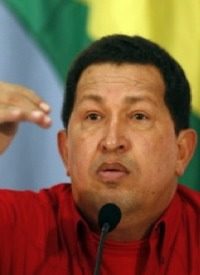
“Bush is to the left of me,” Chavez said after the U.S. Congress approved and the president signed a bill to commit more than $700 billion to bail out mortgage companies and other financial institutions burdened with bad debt. Both presidential candidates John McCain and Barack Obama voted for the measure in the U.S. Senate.
With an obvious sense of irony, the Venezuelan president praised his U.S. detractor as “Comrade Bush” and noted the U.S. government’s purchase of private bank stocks. The Bush administration has criticized the Chavez regime for nationalizing banks and other private institutions in Venezuela. Chavez, meanwhile, having already nationalized large sectors of the national economy, is in negotiations to take over a Spanish bank in Venezuela.
Some $250 billion in the “rescue” plan is being used by the Bush-Paulson Treasury Department to purchase equity in several large U.S. banks.
“Comrade Bush announced he will buy shares in private banks,” said Chavez, who was reportedly smirking when he made his comments because the Bush administration has been promoting free-market policies for Latin America, but has apparently abandoned them in the United States.
The Marxist president is now facetiously praising the titular head of the U.S. administration that reportedly tried to destabilize and possibly overthrow the Venezuelan government a few years ago.
Chavez has also offered a disparaging assessment of Republican vice-presidential candidate Sarah Palin, referring to the former Miss Wasilla and the runner-up in the Miss Alaska pageant as a “beauty queen” who is not up to speed on the issues facing the next president and vice president. Palin said in an interview with the U.S. Spanish-language network Univision that “through negotiations or sanctions, if necessary, we can pressure dictators like Hugo Chavez to make it clear that they cannot mess with the United States whenever they feel like it.”
Chavez, responding while attending the inauguration of a nuclear plant said, “The poor thing, you have to feel sorry for her.” The Venezuelan ruler called the vice-presidential candidate “a beauty queen that they’ve put in the role of a figurine.”
He said as much about Bush, claiming the U.S. president is merely parroting the decisions of his handlers. “I am convinced he has got no idea what’s going on,” Chavez said.
Still, his praise of Bush must be a bitter irony when politicians in the United States, Republicans and Democrats alike, are doing their best to distance themselves from the increasingly unpopular president. Chavez has previously denounced Bush as a “drunkard” and even “the devil,” when speaking at the United Nations. It may also be an embarrassment to Republican presidential candidate McCain, who while making as little as possible of his past ties to the Republican president, has been trying to paint his Democratic rival as a “socialist” because Obama told a questioner, now known as “Joe the plumber,” that he wanted to “spread the wealth around.”
Politicians and pundits are also noting the irony of recent actions by the administration to bail the nation out of the financial collapse caused by the crisis in the mortgage industry. Appearing on ABC’s This Week program on October 26, former House Speaker Newt Gingrich, a Georgia Republican, said he opposed John Kerry for president in 2004 because he feared the Massachusetts Democrat would nationalize the banks and unleash a tidal wave of new spending. In fact, the national debt, now calculated at more than $10 trillion, has more than doubled during the eight years of the Bush administration, including six years with a Republican Congress.
“They came in as social conservatives, they’re going out as conservative socialists,” said commentator David Gergen.
It is another of the supreme ironies in a presidential election year in the United States that seems to be highlighting the words of wag long ago who said, “Satire doesn’t stand a chance against reality anymore.”



